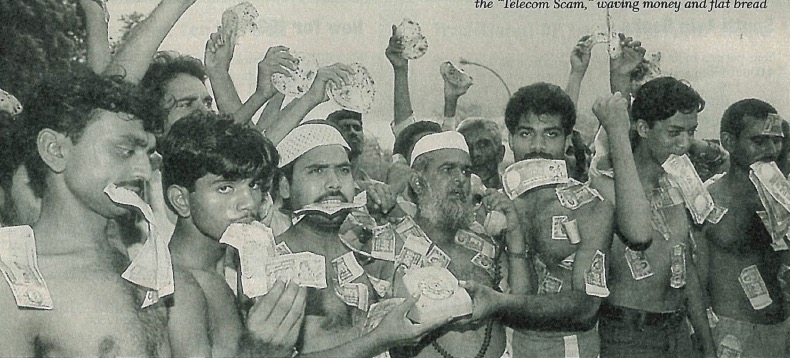Excerpted from The Week, May 25, 1997, “Grease To Go Around” by VIJAYA PUSHKARNA, with contributions from RAJIV MALIK, Delhi
When Prime Minister Indira Gandhi said “Corruption is a worldwide phenomenon,” she had in a way justified the graft prevailing during her regime. Her comments were then widely used by corrupt politicians and government officials to justify their wrongdoings. Later, her son Rajiv Gandhi commented, “Only fifteen percent of what the government spends actually reaches the common man.”
Today nobody disputes that corruption is there. It is in the newspapers every day. By one survey, India is the ninth most corrupt country in the world; another places it fifth. Today’s kids and teenagers learning contemporary Indian political history, instead of relying on books glorifying the past, are bound to know a compendium of scams: the Bofors Scam, the Sugar Scam, the Fodder Scam, the Fodder Machine Scam, the Land Scam, the Wheat Scam, the Urea Scam, the Securities Scam. Bribe, kickback and commission are media buzzwords heard day in and day out.
All over the country, chai pani in the local language means “bribe.” Literally, chai means “tea” and pani means “water” or “cold drink”–originally refreshments purchased for petty officials. Arrange for chai pani, and you can get small things done without a problem. The breeding ground for corruption is wherever minor discretion can be exercised or a small deviation overlooked. In fact, the rules and procedures are so complicated that nobody can follow all of them.
The situation has reached a point in India where, for all major contracts with the government, the percentage is an accepted norm known by both the giver and the recipient. Corruption has now come to mean a demand beyond this understood, fixed percentage. Businessmen and contractors dealing with the government do not complain, because what they pay to bribe government officials is charged right back to the government. But a man on the street cries because to get even small things done he has to pay from his own pocket. Common people are very insecure when they are dealing with the government.
After the coming to light of a number of scams, those who are corrupt–especially those indulging in petty corruption–are often seen saying, “See, even the prime minister and other ministers get briefcases full of money. I am, after all, a poor person. The inflation rate is so high, I have my family to look after. I have marriageable sons and daughters. What does it matter if I also accept some money?” People are more interested in tackling the corruption that grips their day-to-day life than in combating the multi-crore scams which do not directly affect them.
No one in India has a clear plan to solve the problem. Singapore did it by draconian laws rigorously enforced. Mexico City made honest its police force by simultaneously imposing stiff penalties for bribe-taking and increasing police wages and benefits to offset the loss of bribe money.
The national cynicism that has developed in India with regard to corruption is reflected in the following anecdote now making the rounds:
An income tax commissioner was handling the tax returns of an industrialist who happened to be his friend. He was amazed to find 100,000 rupees spent under the heading “dog account.” The commissioner, who had visited the farmhouse of the industrialist, asked how he spent such a phenomenal sum on three or four dogs which he owned. His friend said, “Oh, besides those four dogs, I have to feed at least fifty dogs in connection with my business. My dear friend, how do I account for the money that I pay to various government officials as bribe? My simple solution is that I put all the bribes paid by my company in the ‘dog account.'”
Excerpted from The Week, May 25, 1997, “Grease To Go Around” by Vijaya Pushkarna with contributions from Rajiv Malik, Delhi
PILLAGERS’ PRICE LIST
There are standard bribe costs in every transaction. Here is a sampling from Delhi.
Service bribe (in rupees)
Caught jumping a red light 50-200
Immediate railway seat 30-300
Driver’s license in a hurry 100-1000
Upper-floor mail delivery (monthly) 10-40
Gas line connection out of turn 2000-4000
Gas cylinder during scarcity 50-200
Choked sewage lines cleaned 100-400
Pay to peon to see his boss 10-50
For a clerk to move a file 50-500
To purchase a cinema ticket 20-70
To have your phone repaired 50-100
New phone connection quickly 200-1000
